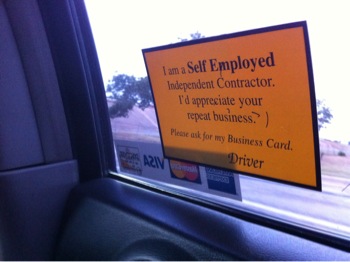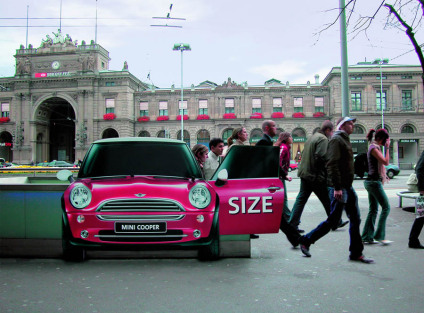This isn't a post about texting while driving. It’s a post about awareness. It’s obviously not smart to drive with your eyeballs focused on the dashboard (or anything other than outside) for more than a second or two. The same rule applies in hospitality. And it’s the one I see broken the most often.
Go out today and watch how many people don’t see you coming. Test it. See how close you can get before they make eye contact, before they smile and before they speak. Those of us formally trained in the business of service know it as the 10 and 5 rule. If a person enters your 10 foot circle, you must acknowledge their presence by stopping whatever you’re doing and making eye contact. Once they hit 5 feet, you must say something to them, presumably something nice.
Awareness though begins outside of 10 feet...at least it does in the customer service business. It starts with your approach on how you do things. You’re either the type that focuses intently on the matter at hand, like sorting receipts or typing an email and tunes out most everything else. Or you focus first on your surroundings and passively on the other busy tasks that you need to get done by the end of the day, shift, etc. Focusing outside your own bubble isn’t something that comes naturally, it’s a developed skill which requires practice. So, if you’re in the hospitality business (who isn’t really), please go practice. And make it mandatory for everyone on your team.
Create Content
Most organizations, and people for that matter, don't spend nearly enough time working on what really matters...meaningful content. Instead they worry more about selling the idea, spreading the word and getting on Oprah (I realize that's actually not possible anymore).
Companies spend more energy and money on interrupting people than ever before, mainly because of the proliferation of channels. They feel pressured to sell the story, buy the ad, talk to the editor...before someone else does. Ironically, if the same energy, passion and commitment was devoted to creating content, they wouldn't need the push...the pull would happen instead.
In a conversation about how to generate more PR, a chef once told me, do something truly remarkable and you can't hide.
Spreading the word is indeed important...but without remarkable content, you're pushing boulders up a hill. Good luck.
Dream Company
I’d probably call it Appelos...hybrid Apple and Zappos
It has nothing to do with computers or an internet store. It’s about their obsessions...
Apple- quality, innovation, design, spirit, growing the tribe
Zappos- employee care, employee dream fulfillment, customer engagement, pursuit of happiness
Obviously, both organizations have been very successful on every measure. But, they also both started at zero and went through serious dips before emerging into what we know today. The key takeaway is how they stuck to their core values and developed obsessions around them. They survived and made progress by ignoring popular trends and advice and simply (but not easily) doing flawless work. They executed their obsessions...and continue to do so.
Lesson...Write down your purpose, what you stand for. Develop obsessions and execute. There, that’s your business plan. Please go do something remarkable.
What's Your Greatest Fear?
Yesterday, a nice person I was interviewing asked me a remarkable question..."what's your greatest fear?"
This reminded me that much of my impression about someone, especially a job candidate, is formed by their questions...not answers.
My answer...being insignificant.
What's your greatest fear?
Don't Answer the Question
Try this experiment the next time a subordinate or child asks you for an answer to a challenging question (warning, does not work well with a spouse)...ask them a question in return. Leaders know how to solve problems and find answers. Giving people answers then doesn't really help develop this critical skill set. Conversely, helping them find the right path teaches them to think and find the right support.
Our Job is to Make Dreams Come True
My perspective on artists, their dreams and our responsibility to keep them fulfilled.
Our Job is to Make Dreams Come True from Michael Chaffin on Vimeo.
Your Style Matters
If you consider that people always do their best work when they are treated fairly and with enthusiasm, why would anyone in a leadership position (boss or peer) treat someone any differently? How many times have we seen someone (or been someone) getting chewed out, diminished or made fun of? Treating people with a lack of dignity and respect is probably the single greatest threat to being successful...at anything.
If you can only spare enough time to make one adjustment...this is the one.
If It's Too Broken, Don't Fix It
Just because it's broken, doesn't mean you should fix it.
The U.S. Postal Service was invented in 1775. Of course there wasn't email, the internet, FedEx, DHL or UPS. If you wanted to get a message to someone, you either sent a telegram, wrote a letter or yelled really loudly. That system worked (more or less) for a long time. Now, it's been disrupted, to the point where staying the course will lead directly to mounting debt and degraded service. Making adjustments to something this broken is a futile undertaking. Especially when the alternatives are already in play.
Time to abandon and start over...or maybe just abandon.
Understanding the People You Lean On
What makes a person tick? What makes their needle spin? What dreams can you help them achieve?
These are the most important questions you can ask someone in an interview (both ways). Without knowing the answer you can’t make the employment relationship anything more than just a job...a transaction, you give me eight hours and I’ll give you $$. And, if it’s just a job, nothing remarkable is going to happen...and eventually you’ll be replaced, out of business, or at best be in a constant struggle to survive.
Who Am I?
Why don't you just talk to me?

Teach, Inspire and Learn= Enthusiasm
I become passionate about what I’m doing when these three things are accomplished. Otherwise, it’s merely a task...and it shows.
What drives your enthusiasm? A very important question which should be answered before taking on any sort of work.
Who Am I Going to Hire Next?
That’s what I focus on...every day. While there are a lot of distractions (many of them good), there’s nothing more important to me than hiring the right people. So, I always reserve time for this task no matter what. When I’m not interviewing prospects, I’m working on improving and preserving the culture that attracts them.
Back to hiring the right people. You hear this all the time...our secret is we hire the “right” people. I’ll define it further...I hire artists. Artists are people who are capable of and interested in producing more than the required tasks. They give you what Seth Godin terms...emotional labor. These are the people that will make your company alive with stories that spread...make you remarkable.
So, here’s what I focus on when I hire...precisely in this order.
- Are they aligned with your culture?
- Can I fulfill their dreams? (I figure if they’re going to give me their heart and soul, I should give them more than a paycheck)
- Are they competent?
This approach has worked for me for quite some time. Realizing there’s a lot that goes into each of those three items, the point here is that the technical part of the evaluation comes last...it’s the least important, at least in the sort of work we do.
I encourage you to worry less about the next big idea, how to change your product or how to market it. All of those things will sort themselves out quite nicely if you make hiring artists and preserving culture your first priorities.
I just finished taping this as a segment in my Art in Hospitality series...will be up soon.
Hospitality Matters Video Series
First in a series of video shorts, see what's going in inside my head...
Getting People to Spread the Word
You're chances of getting people to talk about you are much, much higher if you do something that matters. Building an ordinary hotel and selling rooms for a lower price isn't much for people to crow about.
You're on to something when what you've developed illicits...Did You Hear About...? Or, Did you See...? Or, You Just have to try...
Creating something meaningful that compels people to spread the word is your first order of business, whether it's for yourself or for your company. Without remarkable content, the rest of the road is much more challenging.
Clues

In hospitality we use clues to surprise people...we read them to help us deliver a memorable experience. But, it works the other way around as well. Customers use clues to make buying decisions. And not always the ones a business owner wants them to use. Case in point. The other day I decided to change my insurance company...not because of price or bad coverage...because they insisted on using a fax machine (or worse, the U.S. Postal Service). My decision was based solely on a seemingly trivial point of technology. But my problem wasn’t the fax machine. The fax machine was just a clue. A clue into how the organization thinks...how they approach business. Do they choose easy over right? Do they do the hard work that gives me what I want? Or, do they stay in safe harbor, expect me to jump through hoops and hope I won’t go away.
Starbucks on the other hand continues to earn my respect, not because they make the best coffee (they don’t), but because they learn, evolve and give me what I want. The other day I forgot my wallet in the car (probably because I was so frustrated about using a fax machine). No worries...Starbucks lets me pay via my smart phone. Pretty slick...saved me a journey back to the car. I also like that innovative idea of the little stoppers that go into the lids so you don’t spill the coffee all over your suit. It’s clear they do the hard work to figure out what their customers want. And I bet they don’t use fax machines.
The more choices, the more clues matter.
Art of Asking Questions
Almost no one seeks to understand a customer. Often, there’s an abbreviation, a stop short...it’s called good customer service. Walking by a table in your restaurant and asking “how was everything?” satisfies your requirement...we did our part. And the customer...”it’s fine”...they did their part. A very simple and pleasant exchange...feels good, good service. What if you went a step further? What if you wanted to know what they thought of the new risotto? How would you approach that? What if you learned they seemed interested in how it was prepared? What if you engaged and invited them into the kitchen? What if the chef took some time to share some insight into her approach to cooking? Once you make the investment in really learning something from people the pay-off is huge. They feel special and you get permission...to invite, to learn more, to add another one to the tribe.
Asking the right questions takes the relationship to a more meaningful place...a place of caring and trust. Asking the wrong questions leaves you with the rest of the pack...just another place...forgettable.
Recruiting Changes When...
you have a compelling story and a loyal tribe of raving fans. At this stage, you don t post ads on HCareers and hope for a good bite. Instead, you do what Sasha does at Acumen. You let your audience spread the word and impose a deadline taking advantage of the principle of excess demand over limited supply.
Your goal is to go from push to pull.
If You're Going to Shout...
The Battle for Engagement
I've been in a battle...for a long time. Sometimes the battle is with co-workers, sometimes with bosses, sometimes with myself. Nevertheless it's a battle...to overcome tradition. All my marketing professors, virtually all of my peers and every marketing firm I've ever hired have spent a great deal of time trying to convince me that I'm somehow flawed in my thinking that engaging with people should take precedence over shouting at them.
My argument is based on a simple notion...you have a better chance of practicing art when you're engaged with someone than when it's a one way conversation. Engaged, I have a better shot at making someone feel comfortable, cared for and welcome. Engaged, I have a better chance of building a loyal audience of raving fans. And far less of a chance to annoy them.
Here's the problem...there are serious counter forces at work. Traditional marketing (specifically promotions) is simply easier and safer to do than engagement. There is a huge body of evidence (albeit outdated) and countless pundits that will convince you that banner ads, tv and radio commercials, billboards, email blasts and table tents are the answer to generating more customers and more sales. Generally speaking, this old way of doing things doesn't require much in the way of meaningful content as long a you have a big ad budget. Of course, most of us don't have that...a big marketing budget. Even so, we find our way to tradition somehow, some way. And the paradox continues...in the absence of remarkable content and engagement we're left with the only option...to shout and hope for a favorable response.
For every dollar and minute you spend hanging on to tradition, you rob yourself of the opportunity to engage and build a relationship with a customer, to inspire front line staff to do meaningful work...to do something that matters. I encourage you to begin replacing traditional marketing with engagement activities, perhaps slowly at first. But, later as you gain momentum and the word begins to spread, you'll find yourself measuring referrals, evangelist incentives and rewards instead of click through's and 800 number counts. And, you'll find yourself in a happier place.
Legacy work isn't born from tradition, it's born from hard, meaningful work, done by heretics that often scare others away.


